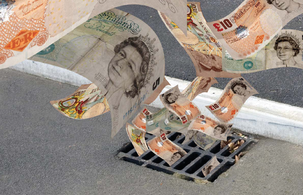
IF you think your hard-earned savings are safe in the hands of a major British bank, think again.
The experience of a Bangkok expat who entrusted £100,000 of his money to this bank, one of the world’s biggest (he prefers not to name the bank, but it was recently embroiled in a major scandal over money laundering) won’t instill confidence in its operations.
The experience of a Bangkok expat who entrusted £100,000 of his money to this bank, one of the world’s biggest (he prefers not to name the bank, but it was recently embroiled in a major scandal over money laundering) won’t instill confidence in its operations.
For several years, the man in question had kept the money in an account run by this bank in the Channel Islands. Out of the blue he was contacted by letter asking him whether he’d like a better return on his money. If so, a financial advisor would be in Bangkok shortly to discuss the matter with him. He agreed.
As a result of that meeting, the expat put £100,000 into medium risk investments as directed by the bank’s advisor, plus an additional £20,000 into a low-yield account that was guaranteed never to be less than his original investment.
Five years later, and after much extremely complicated and largely unintelligible literature from the bank, the man discovered that his £100,000 had shrunk to just about zero. The explanation, which came without a hint of an apology, was that the financial markets at that time during the 2000s were in turmoil and his investment had been gobbled up.
Meanwhile, the bank also informed him that his £20,000 investment was now worth, after five years, an impressive £20,000 and 20 pence!
Exasperated, the expat sought out his advisor who, it transpired, worked part-time for the bank. His day time job was prison guard in the Channel Islands, and another part-time job was night club bouncer.
The fellow now rues the fact that had he invested his money into a couple of listed Bangkok hospitals over the same period, he’d have doubled his money.
As a result of that meeting, the expat put £100,000 into medium risk investments as directed by the bank’s advisor, plus an additional £20,000 into a low-yield account that was guaranteed never to be less than his original investment.
Five years later, and after much extremely complicated and largely unintelligible literature from the bank, the man discovered that his £100,000 had shrunk to just about zero. The explanation, which came without a hint of an apology, was that the financial markets at that time during the 2000s were in turmoil and his investment had been gobbled up.
Meanwhile, the bank also informed him that his £20,000 investment was now worth, after five years, an impressive £20,000 and 20 pence!
Exasperated, the expat sought out his advisor who, it transpired, worked part-time for the bank. His day time job was prison guard in the Channel Islands, and another part-time job was night club bouncer.
The fellow now rues the fact that had he invested his money into a couple of listed Bangkok hospitals over the same period, he’d have doubled his money.






